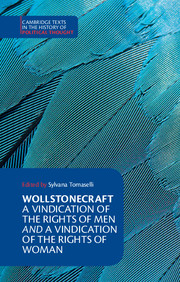Book contents
- Frontmatter
- Contents
- Preface
- Introduction
- Principal events in Wollstonecraft's life
- Bibliographical note
- Note on the edition
- A Vindication of the Rights of Men
- A Vindication of the Rights of Woman
- Dedication
- Advertisement
- Contents
- Introduction
- 1 The rights and involved duties of mankind considered
- 2 The prevailing opinion of a sexual character discussed
- 3 The same subject continued
- 4 Observations on the state of degradation to which woman is reduced by various causes
- 5 Animadversions on some of the writers who have rendered women objects of pity, bordering on contempt
- 6 The effect which an early association of ideas has upon the character
- 7 Modesty. – Comprehensively considered, and not as a sexual virtue
- 8 Morality undermined by sexual notions of the importance of a good reputation
- 9 Of the pernicious effects which arise from the unnatural distinctions established in society
- 10 Parental affection
- 11 Duty to parents
- 12 On national education
- 13 Some instances of the folly which the ignorance of women generates; with concluding reflections on the moral improvement that a revolution in female manners might naturally be expected to produce
- Hints, chiefly designed to have been incorporated in the second part of the Vindication of the Rights of Woman
- Biographical notes
- Index
- Cambridge Texts in the History of Political Thought
9 - Of the pernicious effects which arise from the unnatural distinctions established in society
Published online by Cambridge University Press: 05 June 2012
- Frontmatter
- Contents
- Preface
- Introduction
- Principal events in Wollstonecraft's life
- Bibliographical note
- Note on the edition
- A Vindication of the Rights of Men
- A Vindication of the Rights of Woman
- Dedication
- Advertisement
- Contents
- Introduction
- 1 The rights and involved duties of mankind considered
- 2 The prevailing opinion of a sexual character discussed
- 3 The same subject continued
- 4 Observations on the state of degradation to which woman is reduced by various causes
- 5 Animadversions on some of the writers who have rendered women objects of pity, bordering on contempt
- 6 The effect which an early association of ideas has upon the character
- 7 Modesty. – Comprehensively considered, and not as a sexual virtue
- 8 Morality undermined by sexual notions of the importance of a good reputation
- 9 Of the pernicious effects which arise from the unnatural distinctions established in society
- 10 Parental affection
- 11 Duty to parents
- 12 On national education
- 13 Some instances of the folly which the ignorance of women generates; with concluding reflections on the moral improvement that a revolution in female manners might naturally be expected to produce
- Hints, chiefly designed to have been incorporated in the second part of the Vindication of the Rights of Woman
- Biographical notes
- Index
- Cambridge Texts in the History of Political Thought
Summary
From the respect paid to property flow, as from a poisoned fountain, most of the evils and vices which render this world such a dreary scene to the contemplative mind. For it is in the most polished society that noisome reptiles and venomous serpents lurk under the rank herbage; and there is voluptuousness pampered by the still sultry air, which relaxes every good disposition before it ripens into virtue.
One class presses on another; for all are aiming to procure respect on account of their property: and property, once gained, will procure the respect due only to talents and virtue. Men neglect the duties incumbent on man, yet are treated like demi-gods; religion is also separated from morality by a ceremonial veil, yet men wonder that the world is almost, literally speaking, a den of sharpers or oppressors.
There is a homely proverb, which speaks a shrewd truth, that whoever the devil finds idle he will employ. And what but habitual idleness can hereditary wealth and titles produce? For man is so constituted that he can only attain a proper use of his faculties by exercising them, and will not exercise them unless necessity, of some kind, first set the wheels in motion. Virtue likewise can only be acquired by the discharge of relative duties; but the importance of these sacred duties will scarcely be felt by the being who is cajoled out of his humanity by the flattery of sycophants.
- Type
- Chapter
- Information
- Wollstonecraft: A Vindication of the Rights of Men and a Vindication of the Rights of Woman and Hints , pp. 230 - 241Publisher: Cambridge University PressPrint publication year: 1995



